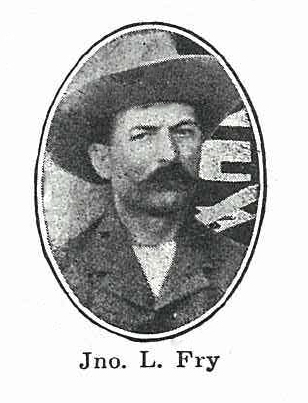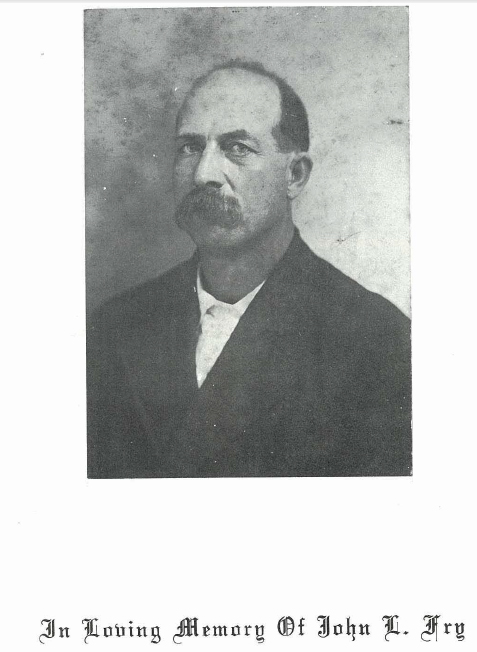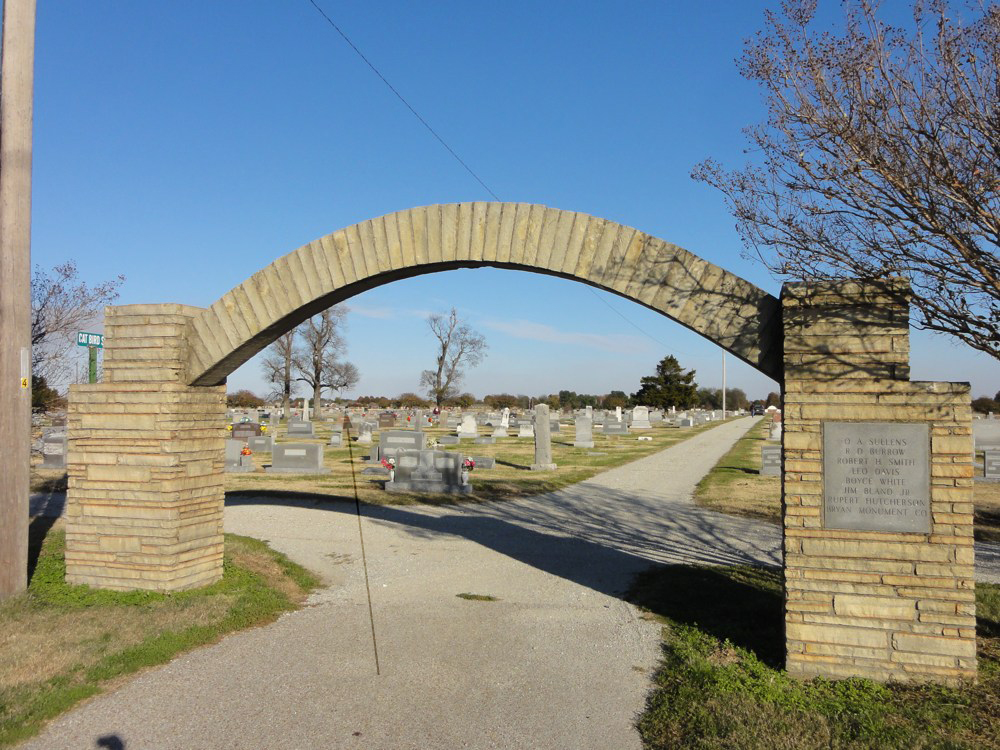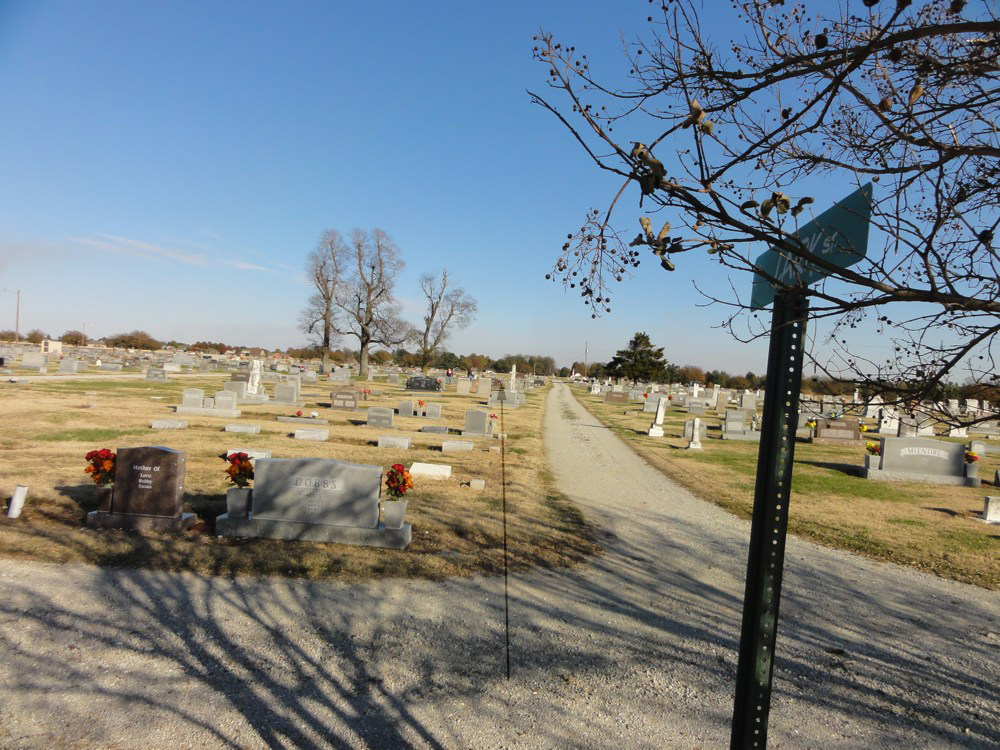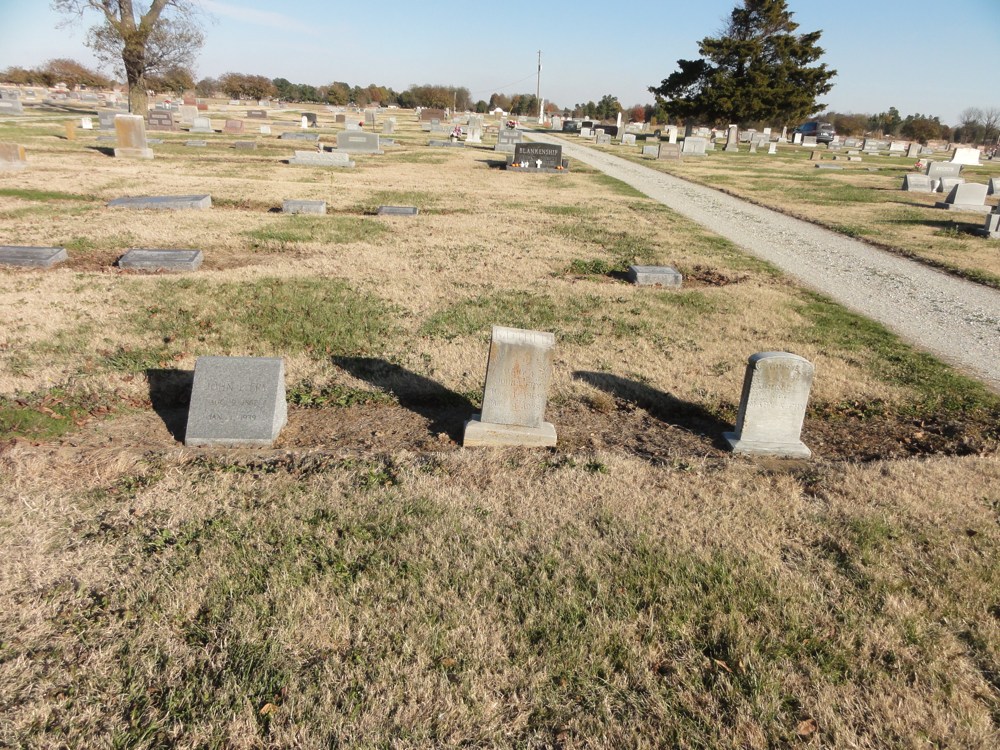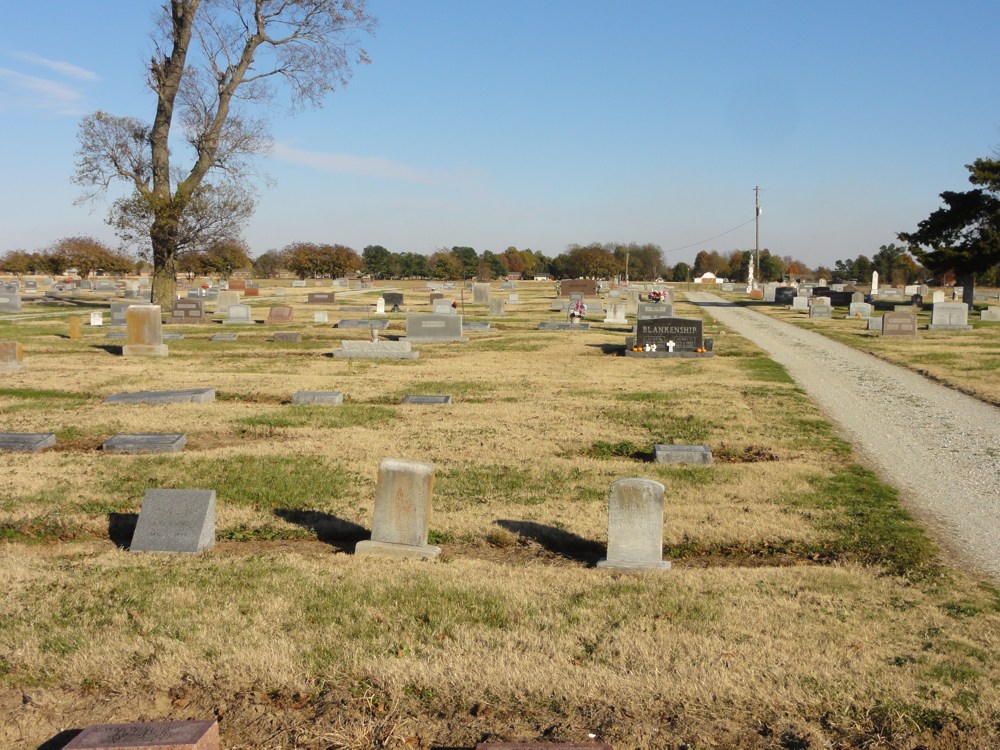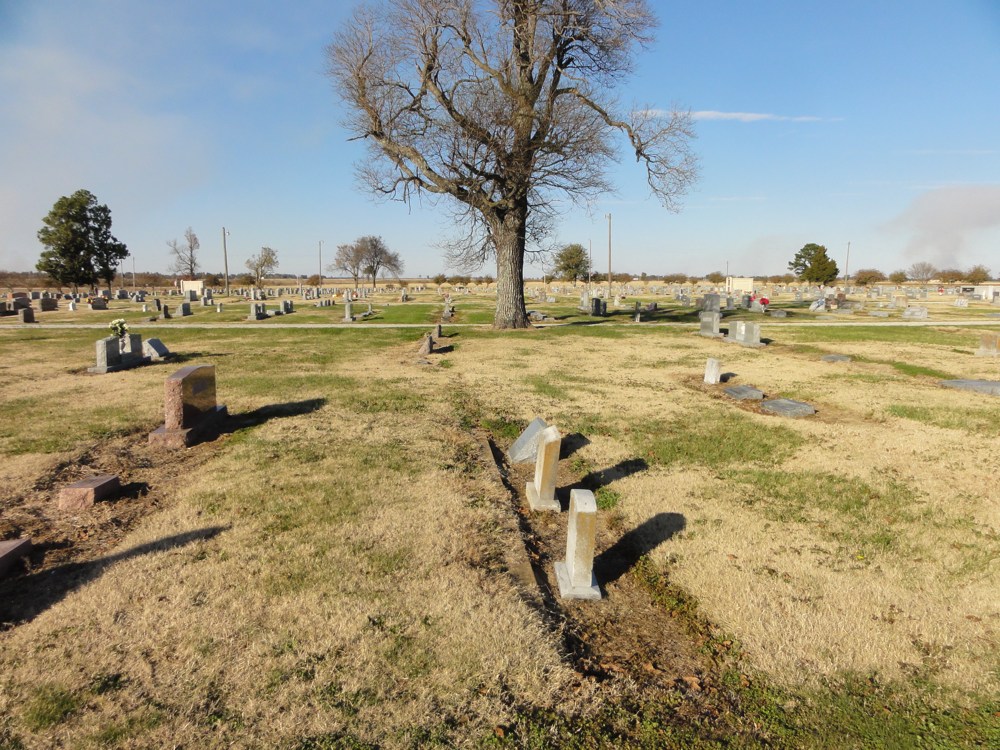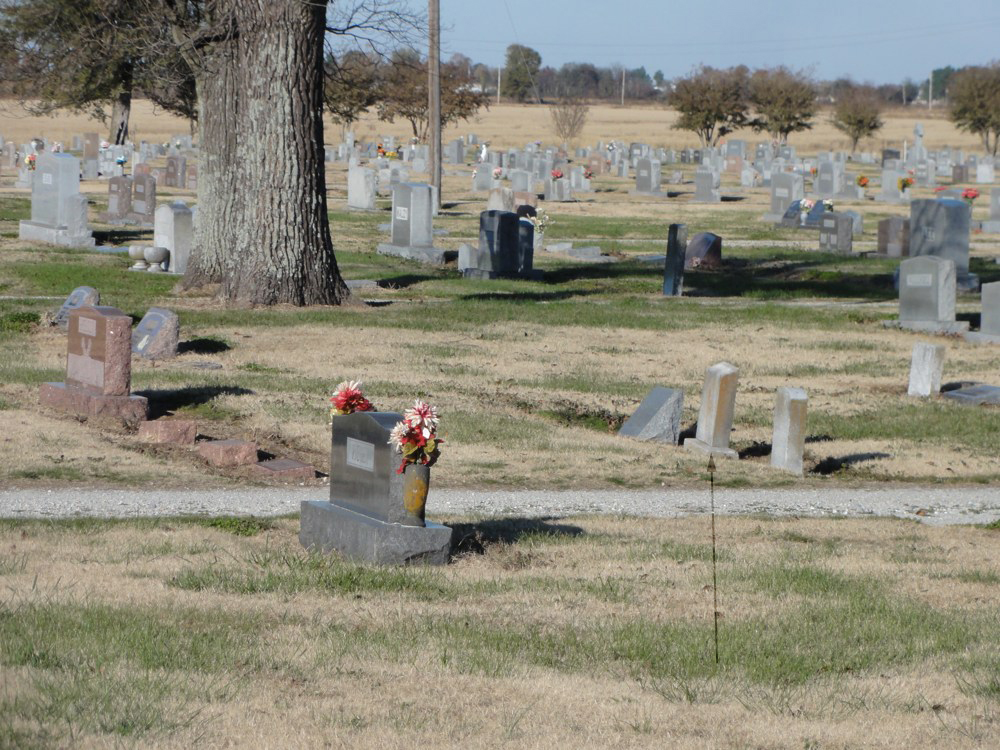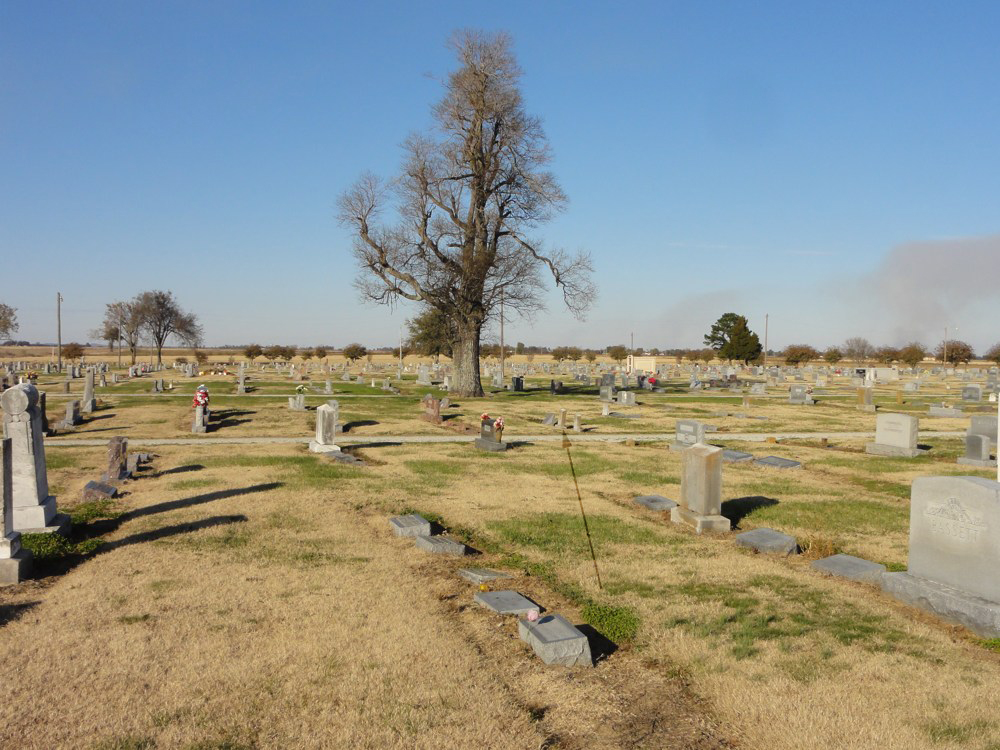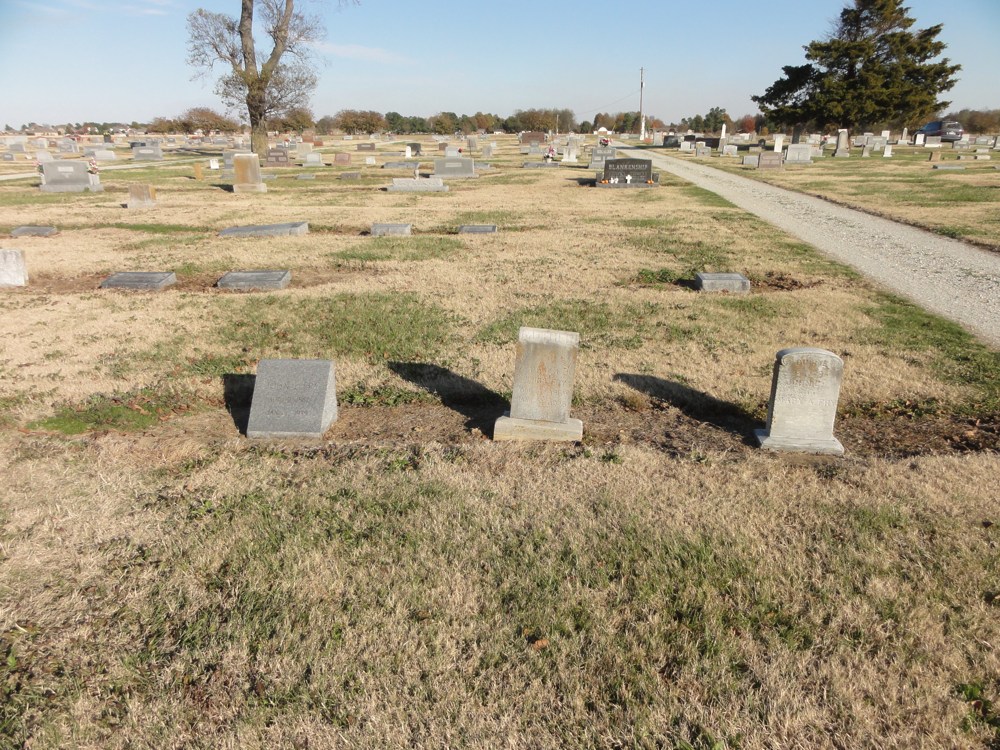John Leondus Fry
1862-1939
![]()
The Life of John L. Fry
1863
Magnificent! This word best describes this champion of the Faith. Every boy has a hero and every man knows he had one when he was a boy. John L. Fry was my hero. No other gospel preacher has touched my life with quite the same influence and power. All during my boyhood I was so closely associated with him that I believed I must do anything he told me to do. Love is born of admiration. I loved Brother Fry. Seeing him, hearing him, knowing somehow that he cared for an insignificant, uncombed, disorganized and disheveled boy inspired me with a keen desire to be like him. He told me he was going to make a gospel preacher out of me. He never failed to do anything he set out to do, so I easily believed he would do it. Never once did I consider the obstacles to his accomplishing this tremendous task. He said he would! That was enough to convince me. Whatever he said, I believed instantly. In fact, he said he was going to make a 'licensed preacher' out of me. That was in contrast to what he called a one-galosed, two by four preacher. Now you will believe this is the story of my life instead of his. Others could tell his story and leave me out. I just cannot. Once he took me with him when he was called to baptize a man who was ill by the name of Milligan. I followed his heels as close as any puppy. The house stood on the bank of a dredged ditch and the baptism was accomplished in the ditch. He slipped his shoes off at the water's edge and I picked them up. He walked back to the house in his socks and I followed him into the room where he was changing his clothes and placed the shoes by his chair. He said, "Boyd, did you know that in olden times the lowliest task you could do for a man was to carry his shoes." I knew no such thing, I was elated to do anything for my hero. I would have carried a spitoon ten miles afoot, if I had thought he wanted me to.
Looking back it seems now that he praised me a lot. I must have been ten years old and he was teaching a bible class. His great booming voice was asking which one of the apostles was responsible for something. No one replied and he insisted on someone answering. There I sat on the front pew drinking in every word. Somehow I thought it was Peter that he wanted them to say. I don't think I knew, I just thought it might be. Finally I summoned enough courage to say "Peter." He heard but he wanted me to answer again. He leaned over me and said, "Who?" I was so frightened that I could barely whisper the answer again. He cupped his hand behind his ear and leaned closer to me and said, "Speak up, who was it?" I answered. To my amazement, the answer was correct. Brother Fry turned to the class and severally upbraided them for not knowing the answer and especially one that a little boy knew. I felt like a King.
Once, I was asked how I felt when I was called to preach. You may remember that sectarian preachers claim a special direct and personal call which gospel preachers never claim. Well, I replied, I was fourteen and when the folks were discussing at the close of the morning service who would preach that night, Brother Fry pointed his finger straight at me where I sat on the front seat and said, Why, that boy there will preach tonight. You see he said I would. It never occurred to me to refuse. He said I would and I thought I had to do it. So I did. That is I tried. My sermon lasted thirteen minutes and to me that was long. I almost lost my breath twice and my knees felt like old Belteshazzar's when he saw the handwriting on the wall. Brother Fry praised the boy and told what a fine job he has done and somehow managed to make me feel I had done something important.
Brother Joe H. Blue baptized me in a meeting at Walnut Ridge, Arkansas during August of 1929. I was twelve in October following. From the time I was baptized I think I belonged to Brother Fry. I carried a ten-cent New Testament in my pocket. Every day when I went to his house after a bucket of milk I got it, and much more. He would say, Now, Boyd, read such and such a verse and tomorrow tell me what it means. A present day application was all I could put on any verse. "Now that's pretty good, Son, he would say, "but this is the Jews and that is the Gentiles, etc." Two or three days later he would ask me again to see if I remembered.
It was in the summer just before my fifteenth birthday that I made my first effort to preach. Soon after my birthday, Brother Fry had me try again. This time I went something near thirty minutes and when the invitation song was sung, Thelma Nicholson came forward and made confession of sin. I was elated. After services, Sister Ella Fry, John L's wife came to me and gave me a quarter. Just a few minutes later Brother Fry came to me and gave me another one. This was my first pay as a gospel preacher.
My first protracted meeting was in July 1935 at Eaton, Arkansas. True to his word, Brother Fry conducted a simple ordination service and presented me with duly signed credentials from the church in Walnut Ridge, before I left for the meeting. Brother Fry was proud of me. I know he was, though others have wondered why.
I don't think I ever thought about the fact that I was not really blood kin to the Frys until I was past thirty years old. Wherever they or any relations of Brother John L's were I was at home and knew I was. It was at Lake City that Dr. Stevens asked me one day, "Brother Morgan just what kin are you to the Fry?" It dawned on me that I was not any. That is, not really kin. I viewed it with a rather bitter disappointment. But to this day no Fry has ever treated me as though I was not kin.
Brother Fry was named John Leondus Fry when he was born August 9, 1863 in Randolph County near Ravenden Springs, Ark. His father was Leondus Fry but was called Lee. His mother's name was Jane.
He is easily one of the most interesting characters I have ever known. Also, the most paradoxial. He was the most loved, the most hated and feared, the most tolerant of human weaknesses and the most intolerant of doctrinal errors that I have ever known. He was an intellectual. A well educated man, but self-educated. He was school teacher, farmer, county surveyor, lawyer, gospel preacher and debator extraordinare.
Married while a teenager he was destined to become an early widower. His first wife was Laura Barber, but she died when Brother Fry was only twenty-two. Two children were born to them. One of them, Will, is still living and lives at Pocahontas and is now 82 years old and has been an ardent worker for the Lord.
About the time John L. married he began teaching school. His first school was on East's Creek near McElroy in Randolph County where he lived. He earned a reputation as a school teacher and was a master mathematician and Grammar scholar.
Widowed for three years, he was married to Mary Ladyman in 1889. Five children were born to this union.
I do not know when or by whom Bro. Fry was baptized. He taught school until he was near 40 years old. His first sermon was near the close of his school teaching career and was at the old and now non-existent Oconee Church in Randolph County. His career as a preacher was extensive and successful. He preached throughout Northeast Arkansas, through Randolph, Sharp, Fulton, Clay, Greene, Craighead, and Jackson counties. In Southeast Missouri from Thayer to Sikeston. Preachers contemporary to him knew and respected him far and wide.
After his school teaching in the hills of Randolph county he moved to Reyno, Arkansas where he farmed and preached by appointment. I do know that in 1905 he lived in Reyno.
After farming at Reyno for three or four years, the Frys moved to Walnut Ridge, Arkansas. Finding no church of our Lord he became instrumental in establishing one there. The first services were held in the courtroom in the upper story of the old Lawrence County courthouse. Brother Van Bench was an able song leader and the two worked tirelessly to see that the cause became rooted and grounded. When the Methodist built a new church house, the little band bought the old building which they vacated. Brother Fry bought the parsonage next to it and lived there until his death.
An excellent mathematician, surveying became an easy accomplishment to him. It is said that he knew every corner in Randolph and Lawrence County. His services extended into other counties, but he held the office of county surveyor for many years in Lawrence County. A great believer in the Divine Providence of God, I remember him telling of a time when he and his wife moved near a school where he taught and there was no church in the community, They had only twenty dollars, he said. I forget the preacher's name but they arranged for him to come and when the preacher got on his horse to leave Brother Fry gave him the twenty dollars which was every cent they had. "Folks, do you know what happened?' The very next day, some men came to get me to survey out a piece of land. Do you know what they paid me? Twenty Dollars." It became a part of his personal proof of bread cast on the waters returning to the giver. He believed in giving and that God would multiply the gift in return to the giver.
Knobel, Arkansas was built where a branch line from Memphis intercepted the main line of the Missouri-Pacific Railroad. A Brother Adams told me of a time when he had met the train to pick up a preacher who was to preach there Saturday night, Sunday, and Sunday night. Brother Fry had come out from a surveying job where he had been a week in the woods to catch the train and return home to Walnut Ridge. He had a week's growth of beard, wore gum boots and a pair of overalls. He had no other clothes with him. The preacher Brother Adams didn't show up and he approached Brother Fry to remain over and fill the appointment. Brother Fry was willing but had no other clothes. This was ignored and they proceeded to the church house. Being a great humorist, when Brother Fry started his discourse he said he felt about like the country preacher who was invited to preach in town for the first time. When the country preacher kneeled to pray he closed his eyes. While he was praying the electric lights (which Knobel had) went off. When the preacher opened his eyes and the building was dark, he shouted, Everybody pray for me quick, the Lord's struck me blind. The Knobel brethren laughed and Bro. Adams who had never heard Bro. Fry preach said he thought, Yes, and that's about all we'll get out of you. With then Bro. Fry began to preach. Bro. Adams said to me, "Brother Morgan, he preached the greatest sermon I ever heard fall from the lips of any man." That was John L. Fry.
Most of his law business was land cases, the making of deeds, etc. I never knew of him handling a divorce or criminal case. Preaching was his life. He would laugh and say he made money 'lawing' and blowed it preaching. There was much truth in his statement, but he wouldn't have had it otherwise. In 1933 Bro. Fry preached in a meeting near Judsonia. Bro. Clarence Smith did the singing. Bro. Fry had to be away one night while trying a case at Hardy and Bro. Smith preached. The two of them together received $13.00 for their services in the meeting.
Twice Bro. Fry made unsuccessful bids for the office of representative of Lawrence County. One of his opponents in one race was Tom Willison, a Baptist preacher. Word was spread around that, "John L. was more interested in getting Tom Allison than he was in getting elected." The race reached its peak when it reached Cache township. Mr. Allison was the first speaker and on taking the stump said, "Well, I've been told that John L. was going to eat me head and shoulders when we got here. I'll tell him one thing, if he does eat my head he'll have more knowledge in his belly than he ever had in his head." Everyone wondered how John L. would answer that. When he arose he said, "Tom, I'm not going to eat your head or your shoulders. I've never had anything common or unclean in my mouth." His retort pleased the audience.
It was as a debater that he was at his greatest. His reputation was known by all. Many were the sectarian preachers who would turn down a side street when they saw him coming. Once a Methodist preacher from Portia thought to belittle him on the street in Walnut Ridge and stopping him said, "Bro. Fry you think I'm going to hell don't you?" Bro. Fry replied, "no." "Yes, you do," the Methodist preacher returned, "I know what you believe and you think I'm going to hell." "No, No," Bro. Fry said, "I think the Bible plainly teaches that all infants and idiots are going to heaven, and I don't think you're going to hell."
He had a habit of resting in a barber shop and reading the paper after he had walked from home to town. Two barbers, one a Methodist and the other a Baptist made it up once to get him 'started' and when he sat down one said to the other loud enough for Bro. Fry to hear, "You know if I wasn't a Baptist I'd go to the Methodist church where you go?" The other said "Hmph! just like you, only the other way around, if I wasn't a Methodist I'd go to the Baptist church." They paused. Bro. Fry remained silent. Directly one said, "Bro. Fry if you didn't go to the Church of Christ, where would you go?" He answered plainly and firmly, "Hmph! If I didn't go to the Church of Christ, I'd go to Hell, that's where I'd go.
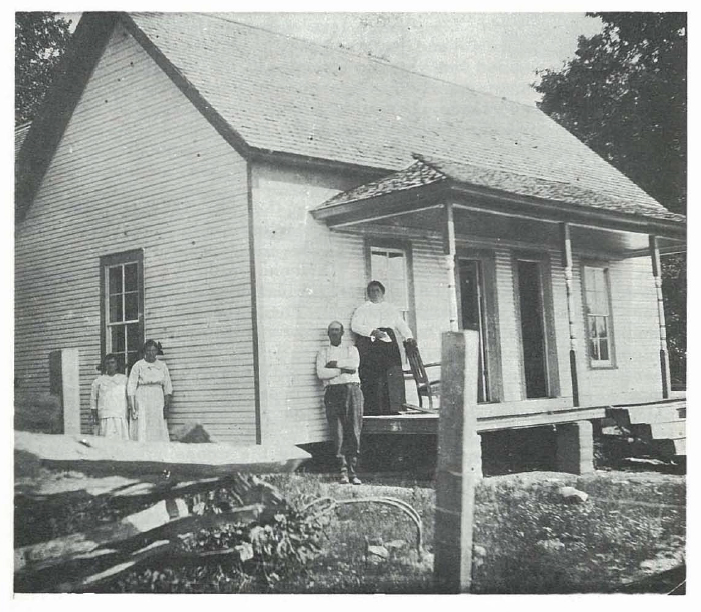 Bro. Fry was to the bottom area and the edge of the hills area what Joe Blue was to the hill area. When the hill brethren wanted a man to meet some sectarian preacher they sent for Joe Blue. When brethren in the bottom area wanted a man they sent for John L. Fry.
Bro. Fry was to the bottom area and the edge of the hills area what Joe Blue was to the hill area. When the hill brethren wanted a man to meet some sectarian preacher they sent for Joe Blue. When brethren in the bottom area wanted a man they sent for John L. Fry.
Around 1910, the Baptists were sorely tormented with the Holiness people at Myrtle, Mo. They went down and got John L. Fry to put the Holiness to flight. Needless to say, he did. Bro. Fry was the grandest to the Baptists until, when he had routed the Holiness people he turned on them. He lost his grand image with Baptists in a hurry.
In 1921 Bro. Fry met the noted Seventh Day Adventists, Thorpe, at Bono, Ark. I think he met him twice more somewhere.
The following article taken from the Sept. 4, 1924 issue of the Gospel Advocate tells of another debate:
"Gainesville, Ark. - The meeting with the Mill Creek congregation, in this county, was a great success. We had thirteen baptisms and one restoration, making forty-five members here, in all. A debate was held here soon after our meeting closed. J.W. Rogers represented the General Baptists and John L. Fry represented the church of Christ. Four propositions were discussed, as follows: (1) "The Church of Christ was established in the days of Christ's personal ministry." (2) "The Church of which I (John L. Fry) am a member was established on the first Pentecost after the resurrection of Christ." (3) "The General Baptist Church, of which I (J.W. Rogers) am a member, is scriptural in origin, doctrine, name, faith, and practice." (4) "The Church of Christ, of which I (John L. Fry) am a member, is scriptural in the conditions of pardon and name." Rogers affirmed the first and third propositions; Fry, The second and fourth. I have been to a great many debates but I never was at one that was so one-sided. Every time Rogers made an argument, just before getting through he would read some scripture that knocked it all to pieces. Brother Fry answered every argument that Rogers made with scripture. We will give Rogers credit for trying to defend his propositions with scripture, but every passage he used came just right for Brother Fry to take it up and turn it against him. We are well pleased with the way Brother Fry defended the truth. The debate closed on Friday, and I preached on Friday night, and at the close of my sermon three came forward and made the good confession and one was restored. We announced baptism for Saturday afternoon, at which time four more came forward and were baptized, making seven baptisms after the debate.--T. T. Pack"
The effect of debating and its good fruits are shown in a report of the same debate in the Dec. 25 issue of 1924. "Lafe, Ark., December 12--Fifteen months ago this was a Baptist community. The pure gospel of Christ had never been preached here. There was one member of the church living here. He sent to Nashville, Tenn., for a preacher to come here and hold a meeting. The meeting began on the first Lord's day in August, last year, and continued for three weeks, resulting in twenty-seven being baptized and two restored. At the close of the meeting a Missionary Baptist preacher challenged the Christian preacher for a debate on the establishment of the church. The brother told the Baptist that he himself did not debate, but would be glad to get a man to meet him. He brought Brother F.L. Paisley over from Tennessee, and as everyone knows, who has heard Brother Paisley, the truth does not suffer in his hands. He pressed that Baptist so hard on the last day that he gave Brother Paisley his hand that there was no such thing mentioned in all the Bible as a Missionary Baptist Church. In fact, at the close of the fourth day Brother Paisley went back to Tennessee, leaving a very discomfited Baptist preacher in Arkansas. As we had no place to meet for worship but a little schoolhouse, one of the brethren gave two acres of ground on which to build a house. The deed has the restrictive clause in it. Last winter we put a fence around the lot, and our beloved Brother Pack returned to us again this year to hold our meeting. It began on the second Lord's day in July, continued three weeks, and baptized six persons. At the close of this meeting, a poor, deluded General Baptist preacher asserted that he could prove to us by the Bible that Christ established his church back on the mount when he sent the seventy forth, and that one must be regenerated and born of the Spirit before baptism. We sent to Walnut Ridge for J.L. Fry. They began the discussion the first Monday in August and continued it four days. The way Brother Fry handled that Baptist reminded one of a mouse in a cat's paw. The Methodists, Missionary Baptists, and General Baptists saw the old man's finish, so the last day they all brought flowers and ribbons to decorate him when he died; and when Brother Fry gently laid him out they kindly covered him up, thinking he was too dead to ever kick again. But he did struggle to life and come back one time to fill his monthly appointment, and that was the last time the Baptists ever met here. The next day after the debate closed, Brother Pack baptized seven more into Christ. Brother Pack is a good man. He certainly did great work here. He holds the blessed Book of God aloft to all and bravely proclaims its truths. We are trying to get our house of worship finished, but find ourselves short of funds; so if anyone reading this is disposed to aid us, it will be appreciated. Send contributions to A.C. Thomas, Lafe, Ark., Route 1. We expect next year, the Lord willing, to hold three mission meetings. When Jesus said "Go" he meant just that; he did not mean for us to work to accumulate all the luxuries of this world for ourselves, and then if we have a few pennies to spare to give them to help hold a mission meeting. We have to sacrifice. May God bless his loving and obedient children everywhere. --Austin Rust.
In 1930 Bro. Fry met Lidell, Baptist of Delaplaine, Ark. at Giles Spur, about 5 miles north of Walnut Ridge. The weather was warm and the house with electricity. The debate was held on the outside. A blackboard was fastened to the back of the house and a small rostrum built on the ground under the blackboard. A table was the pulpit. On the table was an aladdin lamp so the disputants could read from the Bible. I was at this debate. A small arbor was built from off the house which only held a very small percentage of the audience. Bro. Fry was making things plenty hot for the Baptists when out of the circle of darkness came a rock which had been thrown with considerable force. It struck the back of the house, bounced and hit Bro. Fry on his bald head, bringing blood. It then bounded from his head to the lamp breaking the globe and destroying this valuable light until it could be repaired. Bro. Fry stepped down off "the rostrum, challenging the dark and dared the one who had thrown the rock to step forth like a man. No one came forth.
In 1933 he met the famed Ezekiel Sherill, Baptist, in a debate in the top of the courthouse in Walnut Ridge. I attended every night. Sherill made a derogatory quote from some history book about Alexander Campbell. Fry called his hand and demanded proof. Sherill said he didn't have the book. Fry replied that he had it and presented it to Sherill and asked him to read what it said. Sherill said he couldn't find it in the book and Bro. Fry told him the page number and demanded Sherill read it. Sherill did, but it didn't say at all what Sherill claimed. Bro. Fry said, you lied Zeke, you just lied. Sherill became so angry that when his time was called he refused to relinquish the floor. Sherill's own moderator then got up and apologized for Sherill's actions. It was a great victory for truth. This was among the last if not the last debate for the great warrior, John L. Fry.
Sometime in the twenties his second wife, the former Mary Ladyman had passed away. Around 1929 he married Mrs. Ella Gilmore, a widow of Morriston, Ark. I always suspected that Joe Blue made the match. I remember Bro. Fry saying, I know I'm good looking, I just asked three women to marry me and they all did. She took excellent care of him. Their home was open to me at all times and I spent many hours with them. I could read any of his books, and ask him any questions freely. When I began preaching our custom then was to put up a question box and invite people to write out questions which we would answer before we started preaching. Bro. Fry drilled me in the old knotty questions until I could walk up, get a handful of questions and answer them. The answers would hold up, too.
The last sermon I heard him preach was in a meeting I held in 1936 at Williams School house near Alicia. We had all day services that last day and Bro. Fry came down that afternoon, and preached on the "Name." How I would love to hear that sermon again.
III health had begun its toll when he passed the threescore and ten. Cataracts caused one of his eyes to dim and hindered the other. A kidney ailment made him a semi-invalid for several months."
When Hazel and I went to him on April 20, 1938 he performed our marriage ceremony sitting down because he did not feel like standing.
When he became bedfast, in his blunt flat manner, he said, Well, Son, when I kick the bucket, I want them to send for you. I know I looked aghast. He said, "Well, I don't mind 'to die,' but I do hate to lay here and suffer. I just wish I could pass on what I've learned to some young man." Well, I know he tried.
Death came Jan. 1, 1939. Brother T. H. Sherill helped me with the Memorial services, and the champion's body was laid to rest in the Lawrence County Memorial Cemetery. Heaven will be richer for me, just knowing he will be there.
-Boyd E. Morgan, Arkansas Christians, Second Printing, Paragould: College Bookstore and Press, 1967, pages 25-33.
![]()
![]()
Directions To The Grave of John L. Fry
John L. and Mary Fry are buried in the Lawrence County Memorial Cemetery in Walnut Ridge, Arkansas. The cemetery is located off Hwy. 412. Turn right on Colonial Dr./Lawrence Rd. 447. Turn right into the main gate. Then turn immediately left, and then turn to the first right. Head nearly half way up the drive. The Fry plot is on the left. When I was there, the grave was easy to find. It is in line with a large tree at the end of the row.
GPS Location
36°04'49.1"N 90°58'12.9"W
or D.d. 36.080304, -90.970246
![]()
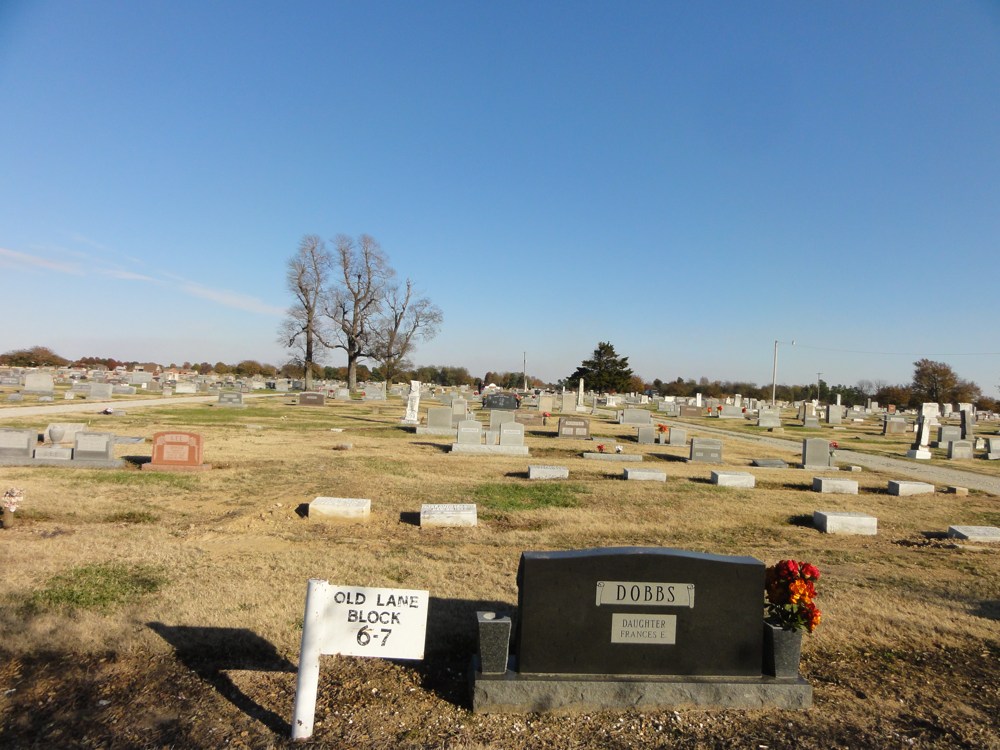
Head back to the trees and look to the right.
Old Lane Block 6-7
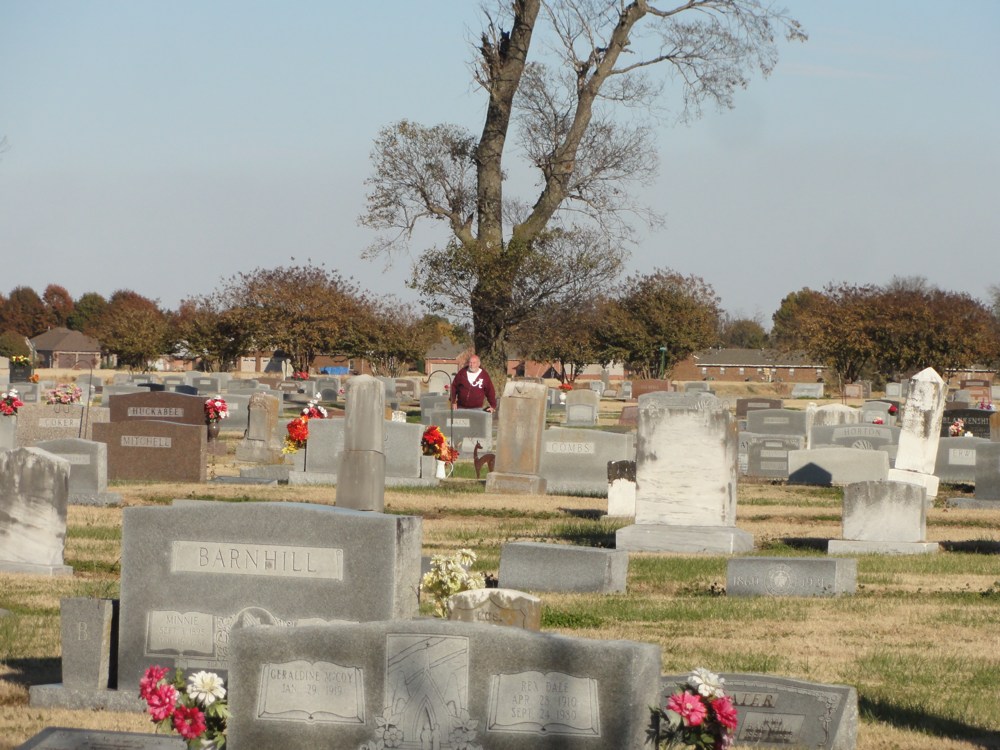
C. Wayne Kilpatrick at the grave of John L. & Mary Fry
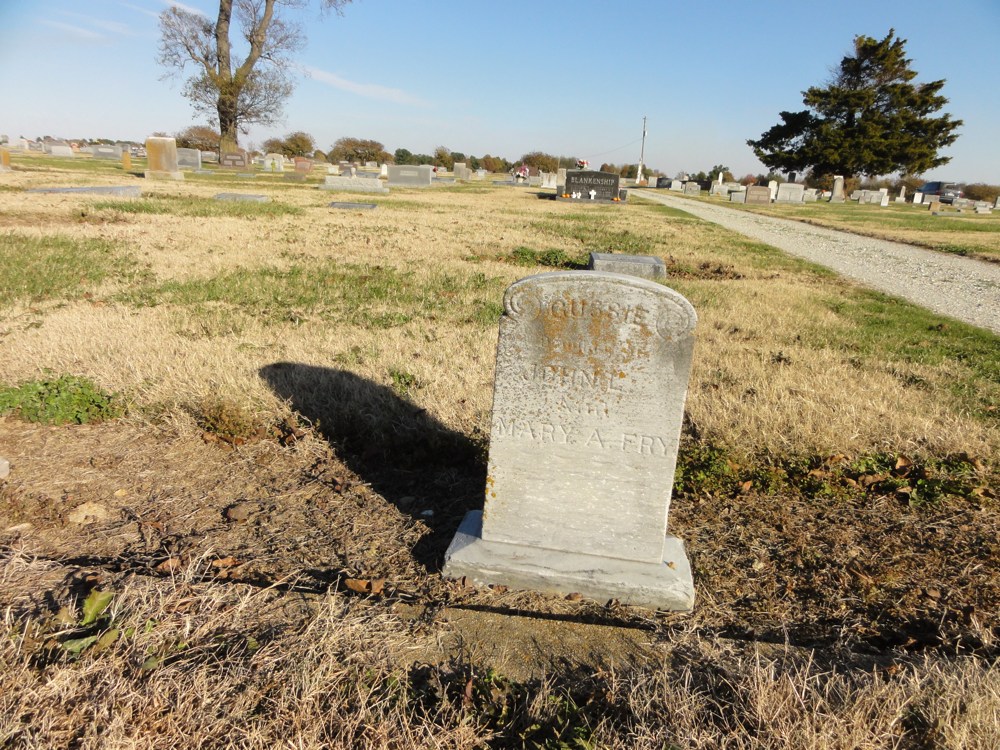
Gussie E.
Daughter of
John L.
And
Mary A. Fry

Mary A.
Wife of
John L. Fry
May 1, 1869
March 4, 1929

John L. Fry
August 9, 1862
January 1, 1939
![]()
Photos Taken 11.14.2014
Webpage Produced 01.05.2015
Courtesy of Scott Harp
www.TheRestorationMovement.com
*Special thanks to Tom L. Childers and Charlie Wayne Kilpatrick for assisting in the burial location. They, along with your web editor, took a trip into northern Arkansas to find the graves of gospel preachers of yesteryear in November, 2014. We traveled together three days and located the final resting places of nearly forty preachers and their families. It was a great trip. Many of the personalities we researched were chronicled in Boyd E. Morgan's book, Arkansas Angels, or later in Dr. Michael L. Wilson's book, Arkansas Christians: A History of the Restoration Movement in Randolph County, 1800-1995.
![]()
